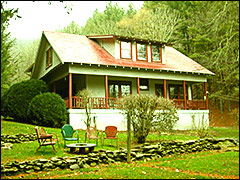It’s startling to see an article in Gourmet — the “magazine of good living” — end with a man groping for a bag of potato chips.

It’s even more startling when that man is you.
That’s the precise position I found myself in a few days ago, when the July issue of Gourmet (unavailable online) arrived.
In it, Elizabeth Royte — author of Garbage Land and probably one of the best non-fiction writers working in the U.S. — trains her reportorial skill on Maverick Farms, the small farm project I helped launch in spring 2004 on land owned by my girlfriend’s family in western North Carolina. Oh yeah, and the place where I live.
Elizabeth’s assignment was to write about our agritourism program, where people can rent a room in the farmhouse for a few nights and, if they’re inclined, work off part of their bill in the field.
She and her family visited the farm in early spring — a pretty manic time on a farm. There’s plenty to do: tend seedlings in the greenhouse, plant salad greens from seed, turn over beds, begin the whole transplanting project. And yet there’s no money coming in, so everyone’s a bit on edge and scrambling to do paid off-farm work.
The Brooklyn-based family was so low-key and charming that we made fast friends. And that meant cooking dinner together and staying up late into the night, drinking wine and expressing (and laughing about) our angst about the Maverick project and our lives. We probably treated Elizabeth to a more open and blunt view of things than the average writer on Gourmet assignment gets from her subjects.
And like Flaubert, but with a lighter touch, Elizabeth rendered what she saw beautifully, in a spare, compact prose that I admire: “Alice Brooke Wilson arrives in a pickup truck with twelve flats of lettuce, kale, and chard and settles them into the creek, where their long roots trail in the current.” That’s a great sentence.
She also teased out the strange class politics of what we’re doing — not a typical topic for glossy food mags (although Gourmet has been transforming the genre).
As for those potato chips, Elizabeth used them to undermine the notion that we represent “foodie rectitude.” The writerly device was good — and so were the chips.

